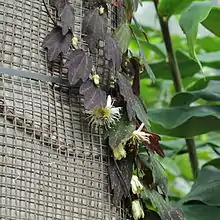| Passiflora telesiphe | |
|---|---|
 | |
| at Kew Gardens | |
| Scientific classification | |
| Kingdom: | Plantae |
| Clade: | Tracheophytes |
| Clade: | Angiosperms |
| Clade: | Eudicots |
| Clade: | Rosids |
| Order: | Malpighiales |
| Family: | Passifloraceae |
| Genus: | Passiflora |
| Species: | P. telesiphe |
| Binomial name | |
| Passiflora telesiphe S.Knapp & Mallet | |
Passiflora telesiphe is a species of flowering plant in the family Passifloraceae. It is endemic to Ecuador.[1]
This is a vine with slender branches. The three-lobed leaves are up to 8 by 11 centimeters. The upper surface of the leaf is dark green, sometimes mottled with white, and the underside is purple. The flowers are solitary or paired with purple-tinged white petals. The filaments are white or purplish and are up to 2.6 centimeters long. The fruit has not been observed.[2] This species is a member of the subgenus Decaloba.[2]
This plant was first formally described in 1998, when it was discovered in Ecuador five years earlier during an observation of local butterflies by naturalists. A male telesiphe longwing (Heliconius telesiphe) was noted hovering about a plant, and the eggs and pupa of the species were found on it. The new plant was then named after the butterfly.[2]
So far this plant is known only from Zamora-Chinchipe Province. It is found in low Andean forest habitat at elevations of 1700m.[1]
References
- 1 2 3 Jørgensen, P.; Pitman, N. (2004). "Passiflora telesiphe". IUCN Red List of Threatened Species. 2004: e.T45762A11010611. doi:10.2305/IUCN.UK.2004.RLTS.T45762A11010611.en. Retrieved 17 November 2021.
- 1 2 3 Knapp, S., and J. Mallet. 1998. A New Species of Passiflora (Passifloraceae) from Ecuador with notes on the natural history of its herbivore, Heliconius (Lepidoptera: Nymphalidae: Heliconiiti). Novon 162-166.
